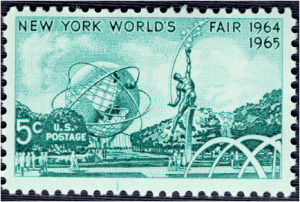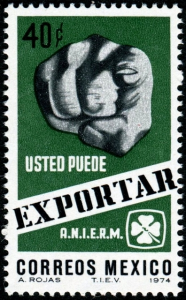Part Ten. Deflation tariffs, countervailing duties, levies, trade and dumping?
 New York World’s Fair 1964-1965 5c U.S. Postage.
New York World’s Fair 1964-1965 5c U.S. Postage.
This is Part Ten of a series showing how inflation, deflation, barter, tariffs, taxes, postage, war, counterfeiting, history, economics, ‘free’ trade, famine, dearth, climate, auctions, precious metals, religion, and education are combined into one great whole.
Part Ten. Why study deflation tariffs, countervailing duties,
levies, trade and dumping?
Inflation is the understanding of business, trade, standard of living, countervailing duties, dumping and economy. Inflation causes its own deflation, and deflation causes barter. Therefore inflation causes barter. Dumping just skips the inflation and directs the direction of the economy to deflation and barter.
Or restated, inflation is necessarily accompanied by deflation, and deflation ends in barter. Thus, inflation ends in barter. Inflation can result from trade, which incentivizes a transfer of wealth. As of this writing, ‘’steel imports were nearly four times [United States’] exports, and that aluminum imports had risen to 90% of total demand for primary aluminum.’’ Countervailing Duty are taxes on imports to bring up the price of the imports, which imports prices had been reduced by subsidies from the exporting countries. The World Trade Organization rules allow these taxes to neutralize the negative (i.e. deflation) effects of subsidies. The Tariff Act of 1930 provide for companies to petition the government for relief.[i]
 4C Seattle World’s Fair 1962. United States Postage. The Space Needle.
4C Seattle World’s Fair 1962. United States Postage. The Space Needle.
Inflation may be due to dumping. Deflation, as a tool in a trade war, includes using excess production, shipped to another country, in order to wipe out the competition, without competing by efficiency. Discounts and obsolete products or services result in a barter economy. Tariffs, also termed duties and taxes, are used to raise the price of imports to reduce their attractiveness in the local state economy. Generally, the term ‘tax’ is avoided to misrepresent the effect on the consumer. The consumer may believe they are paying the tax. Hence, the words duty, or tariff, or levy are used. With an understanding of the background of inflation, from the previous discussions, consider current events as follows.
Photo Credit: Official White House Photo by Andrea Hanks Marine One. Lots of aluminum and steel.
What You Need to Know About Implementing Steel and Aluminum Tariffs on Canada, Mexico, and the European Union
WHAT: President Donald J. Trump is implementing steel and aluminum tariffs on Canada, Mexico, and the European Union following months of discussions to address United States national security concerns.
Today, President Trump announced that he is taking action to protect America’s national security from the effects of global oversupply of steel and aluminum. Following extensive discussions and a months-long process, the President will implement tariffs on steel and aluminum imports from Canada, Mexico, and the European Union.
 4c 1911-Naval Aviation- 1961 United States Postage
4c 1911-Naval Aviation- 1961 United States Postage
The implementation of steel and aluminum tariffs follows the announcement by President Trump on March 8, 2018, of a 25 percent tariff on steel imports and a 10 percent tariff on aluminum imports.
In the initial proclamations in March, President Trump welcomed any country with which the United States shares a security relationship to discuss alternative means to address threatened impairment to the national security caused by their steel and aluminum exports to the United States. The President made it clear that the Administration was willing to work with those countries to find separate arrangements that would meet the national security requirements of the United States.
 The United States has reached an arrangement with South Korea on steel, which was announced on April 30. Included in today’s proclamations, the United States has reached arrangements on steel with Australia, Argentina, and Brazil, and with Australia and Argentina on aluminum.
The United States has reached an arrangement with South Korea on steel, which was announced on April 30. Included in today’s proclamations, the United States has reached arrangements on steel with Australia, Argentina, and Brazil, and with Australia and Argentina on aluminum.
The United States was unable to reach satisfactory arrangements, however, with Canada, Mexico, or the European Union, after repeatedly delaying tariffs to allow more time for discussions.
WHY: Current quantities and circumstances of steel and aluminum imports into the United States threaten to impair national security. These excessive imports are driven in large part by the worldwide glut from overproduction by other countries.
 1974 A.N.I.E.R.M. Asociacion Nacional de importadores y Exportadores de la Republica Mexicana 1974, A. Rogas T.I.E.V. Printer: Talleres de Impresión de Estampillas y Valores ( Mexico) – Correos Mexico
1974 A.N.I.E.R.M. Asociacion Nacional de importadores y Exportadores de la Republica Mexicana 1974, A. Rogas T.I.E.V. Printer: Talleres de Impresión de Estampillas y Valores ( Mexico) – Correos Mexico
In January 2018, the Department of Commerce delivered two reports on steel and aluminum investigations conducted under Section 232 of the Trade Expansion Act of 1962. The reports found that the excessive level of imports threatened to impair the national security because further closures of domestic production capacity would result in a situation where the United States would be unable to meet demand for national defense and critical infrastructure in a national emergency.
On March 8, President Trump accepted the Department of Commerce’s recommendations and began to take action to address the threatened impairment to America’s national security.
 What You Need To Know: Section 232 Investigations and Tariffs
What You Need To Know: Section 232 Investigations and Tariffs
ECONOMY & JOBS Issued on: March 8, 2018
WHAT: Section 232 investigations help to determine the effects of imports on America’s national security and give the President the ability to address any threats to national security by restricting imports through tariffs.
Section 232 of the Trade Expansion Act of 1962, as amended, gives the executive branch the ability to conduct investigations to “determine the effects on the national security of imports.” Within 270 days of initiating any investigation, the Commerce Department issues a report to the President with the investigation’s findings, including whether certain imports threaten to impair America’s national security. The President has 90 days to determine whether he concurs with the findings and, if so, to use his statutory authority under Section 232 “to adjust the imports” as necessary, including through tariffs or quotas.
WHY: President Donald J. Trump has accepted the Commerce Department’s recent conclusion that imported steel and aluminum “threaten to impair the national security,” and is taking action to protect America.
In January 2018, the Department of Commerce delivered the Section 232 reports on steel and aluminum to the President. In February 2018, the Commerce Department publicly released Section 232 reports on imported steel and aluminum. The reports concluded that the quantities and circumstances of steel and aluminum imports “threaten to impair the national security,” as defined by Section 232. The reports found that United States steel imports were nearly four times our exports, and that aluminum imports had risen to 90% of total demand for primary aluminum. The Commerce Department recommended that President Trump take action to protect the long-term viability of our nation’s steel and aluminum industries.
L’Union Europeenne – De Europese Unie, Belgie Belgique 60 Cyprus Estland Hongarie Letland Litoluawen Malta Polen Tcheque Republique Slowakige Slovenie
 President Trump Approves Section 232 Tariff Modifications
President Trump Approves Section 232 Tariff Modifications
Issued on: March 22, 2018. The tariffs on steel and aluminum imports from the following countries are suspended until May 1, 2018, pending discussions of satisfactory long-term alternative means to address the threatened impairment to U.S. national security:
- Argentina; Australia; Brazil; Canada; Mexico;
- the member countries of the European Union; and
- South Korea.
Presidential Proclamation Adjusting Imports of Aluminum into the United States
May 31, 2018 On January 19, 2018, the Secretary of Commerce (Secretary) transmitted to me a report on his investigation into the effect of imports of aluminum articles on the national security of the United States under section 232 of the Trade Expansion Act of 1962, as amended (19 U.S.C. 1862).
The United States has agreed on a range of measures with Argentina and Australia, including measures to reduce excess aluminum production and excess aluminum capacity, measures that will contribute to increased capacity utilization in the United States, and measures to prevent the transshipment of aluminum articles and avoid import surges. In my judgment, these measures will provide effective, long-term alternative means to address these countries’ contribution to the threatened impairment to our national security by restraining aluminum articles exports to the United States from each of them, limiting transshipment and surges, and discouraging excess aluminum capacity and excess aluminum production. In light of these agreements, I have determined that aluminum articles imports from these countries will no longer threaten to impair the national security and thus have decided to exclude these countries from the tariff *.
Secretary Ross Releases Steel and Aluminum 232 Reports in Coordination with White House
Friday, February 16, 2018 Key Findings of the Steel Report:
- The United States is the world’s largest importer of steel. Our imports are nearly four times our exports.
- Six basic oxygen furnaces and four electric furnaces have closed since 2000 and employment has dropped by 35% since 1998.
- World steelmaking capacity is 2.4 billion metric tons, up 127% from 2000, while steel demand grew at a slower rate.
- The recent global excess capacity is 700 million tons, almost 7 times the annual total of U.S. steel consumption. China is by far the largest producer and exporter of steel, and the largest source of excess steel capacity. Their excess capacity alone exceeds the total U.S. steel-making capacity.
- On an average month, China produces nearly as much steel as the U.S. does in a year. For certain types of steel, such as for electrical transformers, only one U.S. producer remains.
- As of February 15, 2018, the U.S. had 169 antidumping and countervailing duty orders in place on steel, of which 29 are against China, and there are 25 ongoing investigations.
Secretary Ross has recommended to the President that he consider the following alternative remedies to address the problem of steel imports:
- A global tariff of at least 24% on all steel imports from all countries, or
- A tariff of at least 53% on all steel imports from 12 countries (Brazil, China, Costa Rica, Egypt, India, Malaysia, Republic of Korea, Russia, South Africa, Thailand, Turkey and Vietnam) with a quota by product on steel imports from all other countries equal to 100% of their 2017 exports to the United States, or
- A quota on all steel products from all countries equal to 63% of each country’s 2017 exports to the United States.
Each of these remedies is intended to increase domestic steel production from its present 73% of capacity to approximately an 80% operating rate, the minimum rate needed for the long-term viability of the industry. Each remedy applies measures to all countries and all steel products to prevent circumvention.
Key Findings of the Aluminum Report:
- Aluminum imports have risen to 90% of total demand for primary aluminum, up from 66% in 2012.
- From 2013 to 2016 aluminum industry employment fell by 58%, 6 smelters shut down, and only two of the remaining 5 smelters are operating at capacity, even though demand has grown considerably.
- At today’s reduced military spending, military consumption of aluminum is a small percentage of total consumption and therefore is insufficient by itself to preserve the viability of the smelters. For example, there is only one remaining U.S. producer of the high-quality aluminum alloy needed for military aerospace. Infrastructure, which is necessary for our economic security, is a major use of aluminum.
- The Commerce Department has recently brought trade cases to try to address the dumping of aluminum. As of February 15, 2018, the U.S. had two antidumping and countervailing duty orders in place on aluminum, both against China, and there are four ongoing investigations against China.
Disclaimer: The author of each article published on this web site owns his or her own words. The opinions, beliefs and viewpoints expressed by the various authors and forum participants on this site do not necessarily reflect the opinions, beliefs and viewpoints of Utah Standard News or official policies of the USN and may actually reflect positions that USN actively opposes. John Choate © No claim in public domain or fair use.
[i] https://www.usitc.gov/press_room/usad.htm. United States International Trade Commission
Utah Standard News depends on the support of readers like you.
Good Journalism requires time, expertise, passion and money. We know you appreciate the coverage here. Please help us to continue as an alternative news website by becoming a subscriber or making a donation. To learn more about our subscription options or make a donation, click here.
To Advertise on UtahStandardNews.com, please contact us at: ed@utahstandardnews.com.



Comments - No Responses to “Part Ten. Deflation tariffs, countervailing duties, levies, trade and dumping?”
Sure is empty down here...